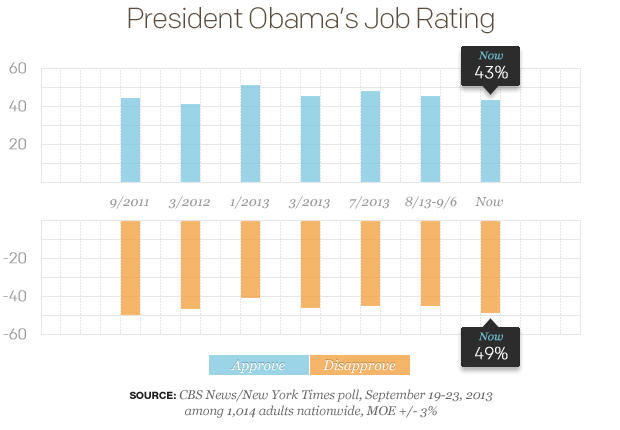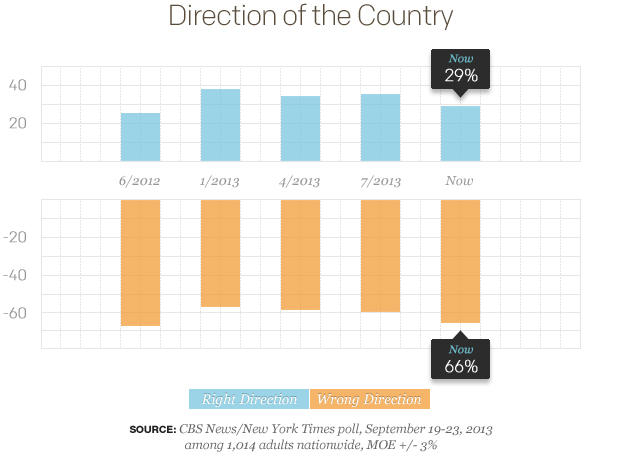Poll: Obama approval drops to 43%
By Sarah Dutton, Jennifer De Pinto, Anthony Salvanto and Fred Backus
President Obama's job approval rating is just 43 percent now, down slightly from
earlier this month and the lowest since March 2012. Forty-nine percent disapprove, the highest it has been in two years.
His approval rating among women has dropped since earlier in September, from 49 percent to 43 percent now.
Positive assessments of the president's handling of the economy has also dropped five points in the last two weeks, to 41 percent now. Just 40 percent approve of his handling of foreign policy, while 49 percent disapprove - the highest disapproval he has ever received on this measure.
This poll finds an uptick in evaluations of President Obama's handling of the situation in Syria since the announcement of a plan to eradicate Syria's chemical weapons; still, a majority disapproves of that as well.
Personal evaluations of the president are also down. Thirty percent say he cares a lot about people like themselves - the lowest level measured since he took office.
Despite the other setbacks for the president in this poll, a majority of Americans (58 percent) see him as a strong leader; those views have remained consistent for a few years, but are substantially lower than in the early years of his presidency.
Congress and the President: Strengths and Weaknesses
In his dealings with Congress in general and on key issues, the president fares better. He receives credit from about half of Americans for reaching across the aisle and trying to work with Republicans in Congress - but that represents a drop from 60 percent in January 2012.
However, far fewer Americans see Republicans in Congress reciprocating. Just 23 percent say they are trying to work with the president, and 70 percent say they are not.
And on some key issues, the President holds an advantage over the Republicans in Congress; more say they trust him to handle the economy (47-33 percent), health care (45-40 percent) and the budget deficit (44-38 percent).
Also, the policies of the Republicans in Congress are widely viewed as favoring the interests of the rich (65 percent), while a quarter of Americans say the same for those of the Obama administration. A quarter also says the administration's policies favor the middle class.
Views of Congress
Most Americans disapprove of the job both Republicans and Democrats in Congress are doing overall, but Republicans receive more criticism. Just 21 percent now approve, down from 25 percent over the summer. Approval ratings for the Democrats in Congress are also down by five points, to 31 percent.
After an uptick earlier this month, Congress' job approval rating is about where it has been for the last few years - just 14 percent approve, and four in five disapprove.
Reducing the Deficit
Most Americans continue to seek a balanced approach to deficit reduction - both through tax increases and spending cuts. Sixty percent advocate a combined solution, compared to the 33 percent who think the deficit should be reduced by cuts in spending alone. Just 4 percent think taxes should be raised without a cut in spending.
Most Republicans (53 percent) want the deficit reduced with spending cuts alone, while most Democrats (77 percent) and independents (58 percent) want a combination of spending cuts and tax increases.
Respondents were asked to choose what to cut from the largest items in the federal budget, and more Americans are far more willing to cut government spending in the military (49 percent), over Medicare (20 percent) or Social Security (14 percent). Cutting military spending is the top choice of Democrats (62 percent) and independents (50 percent), while Republicans slightly favor cuts in Medicare (33 percent) to cuts in the military (28 percent).
The Economy
As they have for over five years, Americans pick the economy and jobs as the most important problem facing the country today, far ahead of health care and the budget deficit.
Most Americans continue to have a negative view of the condition of the national economy. Nearly two thirds say the economy is bad, including nearly one in four who says it is very bad.
Twenty-nine percent of Americans think the economy is getting better, though nearly as many - 27 percent - think it is getting worse. Forty-four percent think it is about the same.
Direction of the Country
Amidst a struggling economy and the impending possibility of a government shutdown, the percentage of Americans who think the country is headed in the wrong direction has risen. Just 29 percent of Americans think the country is headed in the right direction - down six points since July - while the percentage who says it is off on the wrong track has risen six points, from 60 percent in July to 66 percent today. The percentage who says the country is off on the wrong track is now the highest it has been in over a year.
Views of the Affordable Care Act are reflected in views on the direction of the country as a whole. While 54 percent of those who approve of the 2010 health care law think the country is headed in the right direction, an overwhelming 86 percent of those who disapprove of that law think the country is headed off on the wrong track.
The 2008 Bailout
Next week marks five years since the federal government "bailout" of the financial industry - formally, the Troubled Asset Relief Program - was passed amid the 2008 financial collapse. Looking back on it now, a majority of Americans (59 percent) still disapproves of government money having been used to rescue banks and financial firms.
At the time, Americans were also opposed; just three in 10 in an early-October 2008 poll approved of the relief package after it was passed. Americans doubted it would be effective, though many economists have called it necessary under the circumstances.
The measures were passed by Congress and signed into law by then-President George W. Bush. Today's Republicans and tea party supporters, in particular, disapprove in retrospect, while Democrats are more mixed.
Looking back on 2008, Americans widely believe (79 percent) that more bankers and financial executives should have been prosecuted following the collapse.
The 2008 crisis wasn't the first in U.S. history, and Americans expect there will be yet another banking crisis someday: almost eight in 10 think this is likely.
Today, Americans voice mixed confidence in another key economic institution, the Federal Reserve, and its ability to promote growth. Just under one-third express confidence in it, 38 percent have not much or no confidence, and another three in 10 don't know enough about it to say.
____________________________________________________
This poll was conducted by telephone from September 19-23, 2013 among 1,014 adults nationwide. Data collection was conducted on behalf of CBS News/The New York Times by Social Science Research Solutions of Media, Pa. Phone numbers were dialed from samples of both standard land-line and cell phones. The error due to sampling for results based on the entire sample could be plus or minus three percentage points. The error for subgroups may be higher. Interviews were conducted in English and Spanish. This poll release conforms to the Standards of Disclosure of the National Council on Public Polls.

